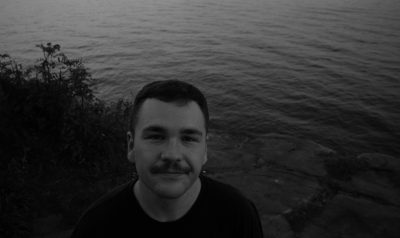Institute for the Oceans and Fisheries (IOF) PhD student, Alexander Duncan, has been appointed to the Indigenous Leadership Circle in Research. This new group will advise the presidents of Canada’s three federal research funding agencies — Canadian Institutes of Health Research (CIHR), the Natural Sciences and Engineering Research Council (NSERC) and the Social Sciences and Humanities Research Council (SSHRC) — and the Canada Foundation for Innovation, on the implementation of a strategic plan to support Indigenous research and research training in Canada.
A member of the Chippewas of Nawash Unceded First Nation in southwestern Ontario, Duncan joined the Centre for Indigenous Fisheries at the IOF in 2021. His work focuses on Indigenous fisheries in the Great Lakes, specifically Indigenous and human dimensions of sea lamprey control. He wants to understand Indigenous perspectives on the methods used to control the invasive and parasitic sea lamprey, which cling to fish using their suction-cup mouths, and drain fish blood, on which they feed, with their sharp teeth and spiny tongues.
He wants to understand Indigenous perspectives on the methods used to control the invasive and parasitic sea lamprey, which cling to fish using their suction-cup mouths, and drain fish blood, on which they feed, with their sharp teeth and spiny tongues.
“My interests align closely with the mandate of the Centre for Indigenous Fisheries: conducting fisheries research with and for Indigenous people,” he said.
The setting new directions to support Indigenous research and research training section in Canada’s 2019-2022 strategic plan outlines a path to increase Indigenous participation and leadership in research, establish clear guidelines for working respectfully with Indigenous communities, enable Indigenous student success, and much more.
Duncan will join an 18-member group of scholars from across Canada whose role will be to monitor progress of the plan’s implementation, look for issues and opportunities, recommend approaches to support the plan’s successful implementation, and provide guidance on matters that could enhance support for Indigenous research and training.
“In the past there have been some initiatives for Indigenous research and scholarship, but they aren’t always led and guided by Indigenous people,” Duncan said. “The plan, and the creation of the Leadership Circle, mark an important shift towards better inclusion.”
Duncan hopes that his background in social sciences and fisheries research will help inform the decision-making processes of the Leadership Circle when they meet for the first time this June. He is one of two students in a group comprised of Indigenous thought leaders and researchers.
“My main priority will be to provide my perspectives and input, and be honest and upfront. I obviously have a vested interest in Indigenous Peoples, and I’d like to advocate for fisheries across Turtle Island; I’m in fisheries, and I think they’re really important,” he said.
“I’m very pleased to be representing not only my nation and the Great Lakes, but also UBC, the IOF and the Centre for Indigenous Fisheries.”
Tags: awards, Centre for Indigenous Fisheries, Indigenous fisheries, Indigenous Knowledge